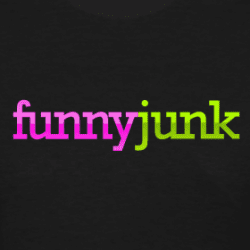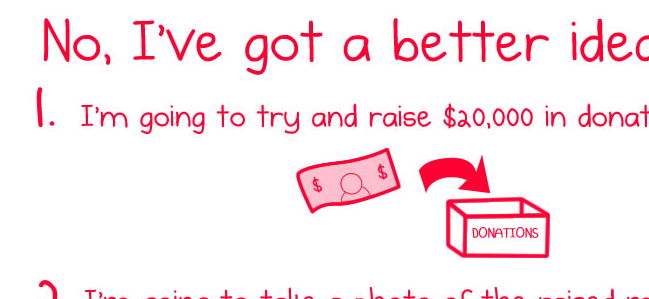The FunnyJunk/Oatmeal Debacle
 As copyright-related debacles go, the Oatmeal/FunnyJunk had been one of the more entertaining skirmishes on the Web. Pitting a cartoonist against a content aggregator he accused of stealing his work wholesale, it had been a war of words fought primarily with witty insults and comics rather than serious legal threats.
As copyright-related debacles go, the Oatmeal/FunnyJunk had been one of the more entertaining skirmishes on the Web. Pitting a cartoonist against a content aggregator he accused of stealing his work wholesale, it had been a war of words fought primarily with witty insults and comics rather than serious legal threats.
However, on June 2nd that changed.
That was when FunnyJunk, the aggregator, served Matthew Inman, the creator of the comic strip The Oatmeal, with a cease and desist letter that demanded not only a retraction of prior statements, but a settlement demand of $20,000.
Inman balked at the idea of paying FunnyJunk, which was still hosting hundreds of his comics without permission, any amount of money but still did not wish for this litigation to move forward. Instead, Inman took up his pen, drew a comic in response and hatched a different plan, one by which he attempted to raise $20,000 and then donate it to two charities, namely the National Wildlife Federation and the American Cancer Society. He would, however, mail a picture of that photo along with a drawing of their “mom seducing a Kodiak bear” to FunnyJunk.
The fundraising campaign turned out to be a massive success, raising the $20,000 in just 64 minutes and now reaching some $114,000 as of this writing (less than a day after it being posted). The response also went viral, appearing at the top of Reddit and elsewhere on the Web.
But how did this situation get so out of hand and what, realistically, will come of it. We have to look at the history here and what the law says to find out the answers.
Ancient History and Present Arguments
 Some time about two years ago, Inman learned that many of his comics were appearing on FunnyJunk without his permission and, often, without attribution or even having the attribution portion of the image lopped off. He contacted the site and got some of the images removed, but the spread of his content on the site just kept accelerating. Upset, he wrote an open letter to the admins of the site (linked above) and noted that many other popular comics were also widely available on the site as well.
Some time about two years ago, Inman learned that many of his comics were appearing on FunnyJunk without his permission and, often, without attribution or even having the attribution portion of the image lopped off. He contacted the site and got some of the images removed, but the spread of his content on the site just kept accelerating. Upset, he wrote an open letter to the admins of the site (linked above) and noted that many other popular comics were also widely available on the site as well.
FunnyJunk responded, with a letter to its users claiming in part that “The Oatmeal wants to sue funnyjunk and shut it down! He thinks we’re nothing more than dirty content thieves…” The letter went on to encourage all users of the site to contact The Oatmeal.
This resulted in Inman being flooded with emails and Facebook page comments on the subject.
Despite the hostile approach, FunnyJunk did remove many of Inman’s comics, at least the one with “The Oatmeal” in the name and removed others they were notified of.
After that, however, the issue seemed to die down. Inman, realizing that they were at an impasse, decided the effort needed to track down and silence every use of his comics on the site and he simply dropped it. The case slipped out of people’s minds, including my own, and back into obscurity, with both sites returning to their normal routines.
But on June 2nd, the issue was kicked up again in a major way. Funny Junk hired attorney Charles Carreon to send Inman a legal threat. The threat demanded that Inman not only remove allegedly defamatory statements but also pay $20,000 in damages.
Inman balked at the threat and posted his response on his site. In it, he not only dissected many of the claims in the letter, including some of the more odd ones, but created a counter-proposal by which he would raise the $20,000 and then donate it to charity after mailing a photo of the money and an offensive drawing he had created for the case.
The ball, as the saying goes, is in FunnyJunk’s court. As of this writing, Inman had raised the $20,000 in just 64 minutes and had a total well north of $110,000, more than five times the target amount.
However, this raises a question, should this case come to legal blows, what is the likely outcome? It’s almost impossible to predict court cases due to the many unknown variables and the purely random nature of them, but we can at least hypothesize who would have the upper hand.
A Difficult Defamation Case
Defamation law is handled largely on a state-to-state basis. As a result, specifics will vary but it seems likely that, no matter where the suit would be filed, FunnyJunk would have an uphill battle in making its case.
Though corporations can be defamed and sue for defamation (Note: Inman never mentioned anyone personally in his posts, making this, most likely, a corporate case) they are generally considered public figures for the purpose of defamation cases.
That means the burden of proof would be on FunnyJunk to prove actual malice, meaning that they have to prove that Inman intentionally and maliciously harmed the reputation of the company.
While some of Inman’s statements may be defamatory, proving that they were written with actual malice would be almost impossible considering that, they would have to show that the statement was false, that a reasonable person could believe them to be true, was not presented of a matter of opinion and that Inman was willful in his attempt to harm FunnyJunk’s reputation (meaning Inman did not know it was untrue).
The statements, mentioned in the letter, include:
Here’s how FunnyJunk.com’s business operates:
- Gather funny pictures from around the internet
- Host them on FunnyJunk.com
- Slather them in advertising
- If someone claims copyright infringement, throw your hands up in the air and exclaim “It was our users who uploaded your photos! We had nothing to do with it! We’re innocent!”
- Cash six figure advertising checks from other artist’s stolen material
and
There’s still hundreds of C&H comics hosted on FunnyJunk.com, as well as thousands from other artists: (Followed by links to other artists and relevant searches on FunnyJunk’s site)
The second statement was clearly true at the time it was posted and, though it’s not true now (FunnyJunk removed the links specifically mentioned though other comics exist) there doesn’t seem to be much argument against the validity of that statement at the time (and at least in principle today).
It’s the first statement that seems to have caused the most controversy as it appears to accuse FunnyJunk of willful infringement, even though FunnyJunk is quick to point out that everything posted to the site is at the discretion of the user. In fact, FunnyJunk also notes in the letter that it does have a DMCA policy and remove infringing links when notified.
But does that rise to the level of defamation? It’s tough to say but, as discussed above, FunnyJunk has a long, hard road ahead of it to prove that it does.
To make matters worse for FunnyJunk, corporate defamation is often looked at in the light of being a possible Strategic Lawsuit Against Public Participation (SLAPP) that, depending on the state the suit is filed in, can result in an anti-SLAPP lawsuit being filed against them.
These lawsuits are typically filed by corporations against individuals in an attempt to silence criticism and have less to do with winning the suit and more to do with intimidation and burdening individuals and smaller companies with impossible legal bills.
If FunnyJunk filed in an anti-SLAPP state and it was found to be such a lawsuit, it could be FunnyJunk paying damages, not Inman.
In short, even if the text is viewed as defamatory, given FunnyJunk’s position as a corporation, making a defamation suit against Inman work would be difficult, costly and risky.
Even if they can win, it likely isn’t worth the effort.
What About the Copyright Issues?
When the debacle started last year, the issue was that Oatmeal comics were appearing on FunnyJunk without permission or attribution. FunnyJunk, however, was quick to say that it was not the uploader of the comics and was protected by the DMCA.
On the surface this appears to be largely true. FunnyJunk does have a solid DMCA policy on their site and, by most accounts, they do follow it reasonably well.
However, there are several problems with their safe harbor claim. The biggest is that FunnyJunk has not registered their DMCA agent with the U.S. Copyright Office, a requirement under the law for DMCA safe harbor protection. In short, they have not completed all of the steps needed to use the DMCA.
Is that enough for Inman to sustain a copyright infringement claim (assuming he properly registered his works)? It’s difficult to say and it would largely depend on the Circuit the case fell in. However, it certainly gives Inman a potential avenue of attack to make copyright claims.
Howver, as the Viacom/Youtube case has shown, sometimes in discovery other items come to the surface. It could also be that FunnyJunk employees also uploaded Oatmeal comics (thus likely removing safe harbor protection) and it could also be found that FunnyJunk was actively encouraging infringement, thus making it possible they could be liable under the theory of “inducement” as per the Grokster case.
Still, the truth remains that FunnyJunk, no matter how much they’ve built their community around the idea of lifting other people’s work, is an site the users do the posting, meaning the law treats it very differently.
Bottom Line
In the end, neither side likely has a case truly worth pursuing. The costs and challenges of making such a case combined with the risks and limited rewards make neither lawsuit a wise one in my view.
Still, it does raise an interesting question: What is all of this about really?
For Inman it seems pretty simple, his comics, which he makes his living off of, were being widely misused on a site and he wanted it to stop. But Why did FunnyJunk come back so heavy-handed with a defamation lawsuit threat and, even more strange, do so almost a year later?
The answer seems to be found in their letter, which pays special attention to the SEO implications of the first battle with The Oatmeal. If you search for “Funnyjunk” in Google, you’ll likely find that the second and third results, just behind FunnyJunk itself, are both The Oatmeal. The rest of the first page, now, seems to be almost entirely stories, like this one, covering the battle.
I seriously doubt that FunnyJunk was truly interested in or expecting $20,000. Instead, the damages were likely a negotiating tactic to get Inman to remove the previous posts about FunnyJunk (and maybe negotiate a much smaller settlement).
If that is the case, then the plan horribly backfired and a previous controversy has been re-ignited in a much bigger and worse way. No matter what happens legally with this case, more people than ever are aware of this dispute and most seem to be siding with The Oatmeal.
If the SEO implications of the first battle were bad for FunnyJunk, these are likely going to be catastrophic.
Want to Reuse or Republish this Content?
If you want to feature this article in your site, classroom or elsewhere, just let us know! We usually grant permission within 24 hours.
